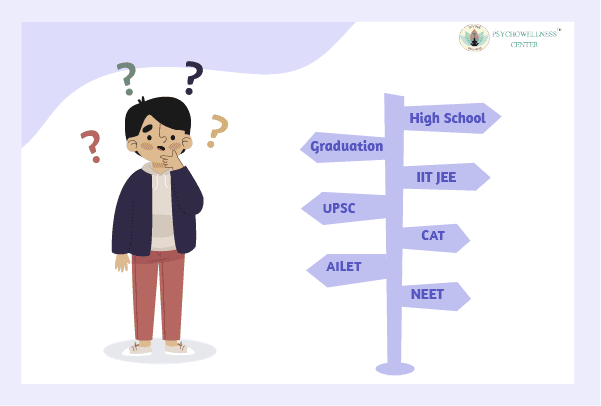Top Reasons to Try Motivational Enhancement Therapy
-01.png)
Motivational Enhancement Therapy (MET)
Motivation is an effective indicator of recovery. In recent years, treatment for addiction have moved away from punitive strategies and abstinence programs to an emphasis on motivation and change-oriented interventions. One of these interventions is called Motivational Enhancement Therapy (MET). Talk to the best psychologist in India to know more.
Motivational Enhancement Therapy (MET) is an approach to therapeutics designed to help people recognize and overcome ambivalence about drinking and other substances. Also known as motivational interviewing. MET concentrates on improving determination and setting targets. This approach to therapy involves an assessment, followed by a series of counselling session (3-6 session) each week that promote discussion about the use of substances and evoking change talks or motivational phrases. Methods for MET include making goals as well as planning for change and promoting internal motivation. The therapist collaborates with the patient to observe changes to identify triggers, as well as examine strategies for coping and quitting. The purpose for MET therapy is to overcome the ambiguity and assist an individual to alter their drug usage patterns. This therapy can be applied by Counselling psychologists, Relationship counsellors.
How does MET function?
The MET method focuses on four main elements through the therapeutic process:
Empathy: Therapists use empathy by listening with reflective intent. This helps to increase empathy, increase understanding and acknowledge the difficulty of change. This aspect of therapy is often referred to as engaging.
Developing Discordance: The therapist helps the patient to determine values and goals, and also how the current behavior is interfering with these values and goals. The therapist and the patient collaborate to determine the target behaviours they'd want to change. This aspect of the therapy process is referred to as focus.
Rolling of Resistance: MET strategies are designed to prevent direct confrontation. Instead of fighting against resistance and ambivalence is a part of the process, and something to consider. In this stage, "change talk" is activated and is reinforced.
Enhancing self-efficacy and autonomy: This is often the phase that is used to plan therapy. Strategies to plan for change as well as deal with crises and obstacles that block the path of progress are discussed. Goal setting and commitment is often discussed with a family member during the session to reinforce the process of change.
Goal of the MET
The MET program was specifically designed for the purpose of addiction recovery and its ultimate goal is to improve motivation. The primary goal for MET is to bring your client to a positive state of change. Once they are in this level the therapist and the client are able to come up with an action strategy. In contrast to other rehabilitation methods, MET does not set up to make abstinence the objective. It is presented as an option that is clear when the client is willing to make a change.
Therapists may provide evidence which proves the benefits of abstinence, and may even challenge the purpose of moderate consumption, if the client wishes to do so, but MET makes it possible clients to select their own goals for recovery. This is a significant distinction as most addiction programs provide an assessment and provide that the client must eliminate the substance completely. Motivational therapy, such as MET, and other therapies focus on autonomy as well as respect to the individual.
In contrast to CBT and CBT, which presumes that the client already has motivation and has no strategies for building motivation, MET has direct and specific guidelines and strategies to build motivation in clients. Motivational therapies are founded on the assumption that the client is capable of changing and possess the internal resources needed to make that change.
Benefits of MET
The MET method has been proven to be beneficial in helping patients overcome issues of ambivalence before beginning treatment. The benefits of MET are:
It's a short-term treatment which can help get the treatment off with a solid foundation and eventually result in a higher degree of treatment completion and success.
It increases the readiness of clients for participation in treatment by fostering confidence and willingness to make changes.
The MET method is a short-term therapy that will prepare you for the next steps during treatment, such as CBT and DBT. MET engages you in the place you are and helps you towards positive attitudes towards recovery and treatment.
What Motivational Enhancement Therapy can help with?
The MET program can assist with various problems, such as drug and alcohol addictions, risky behaviours and addictions, trauma-related problems, eating disorders and anxiety disorders. It has been reported that MET can help patients reach a state where they're more prepared to stop risky behavior; this is particularly beneficial to those who suffer from addictions or obsessional/intrusive behavior.
People who have a high degree or resistance to change have been found to greatly benefit from MET because of its focus is non-judgment and on the root of the issue that drives the individual's behavior. The MET program can also lower the chance of having one or more mental health problems.
The MET can aid in these situations:
Addiction
Eating disorders
Obsessive compulsive disorder (OCD)
GAD, also known as generalized anxiety disorders (GAD)
The post-traumatic stress syndrome (PTSD)
Bipolar disorders
MET Therapists employ various methods to stimulate and build confidence in their clients' "change talk." There are specific guidelines to follow when selecting questions to ask and what information to consider and review. Studies have shown that therapists or Online counselor who follow the MET-consistent techniques can substantially increase the frequency of client talk which, in turn, can predict results of change in behavior. Therapists who use MET usually begin by establishing a solid base of skills for counselling that are centred on the client (reflective listening, open-ended questioning, affirmation summary) and then they learn to recognize, trigger the client's desire to change-talk by applying these skills strategically. You can seek support from the Best psychologist delhi or search for the Therapists in delhi to get the help you need for the present situation.
Additionally, you may schedule an appointment with the top professional psychologists and receive Mental health counseling at the Psychowellness Centre, which has many locations in Delhi NCR, NOIDA, Faridabad, Janakpuri, Dwarka, and Vasant Vihar.
Contribution: Dr (Prof) R K Suri, Clinical Psychologist, life coach & mentor TalktoAngel & Mr. Utkarsh Yadav, Psychologist.

.png)


SHARE